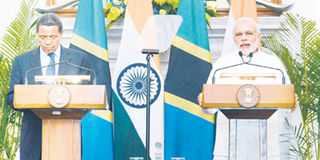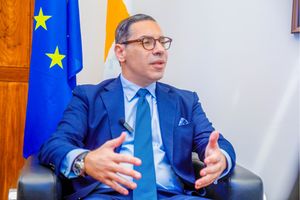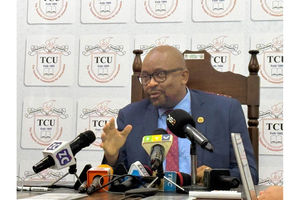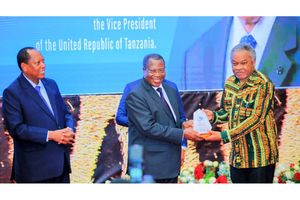What to expect from Modi visit

Tanzania and India held talks on a range of bilateral issues during the President Jakaya Kikwete's visit to the Asian Nation last year. PHOTO|FILE
What you need to know:
The visit is a prodigious opportunity to demonstrate the incredible gains made in Tanzania’s relations with India since Modi’s party, the Bharatiya Janata Party (BJP), won the general election with a thumping majority in May 2014 and to renew and deepen bilateral economic cooperation, seen by many analysts as crucial for progress.
Dar es Salaam. Prime Minister Narendra Modi’s state visit to Tanzania this today is a powerful symbol of the “new energy” he and President John Magufuli are bringing to Tanzania–India relations only eight months after Magufuli’s landslide victory in November last year.
The visit is a prodigious opportunity to demonstrate the incredible gains made in Tanzania’s relations with India since Modi’s party, the Bharatiya Janata Party (BJP), won the general election with a thumping majority in May 2014 and to renew and deepen bilateral economic cooperation, seen by many analysts as crucial for progress.
Enhancing relations with India is a matter that enjoys solid bipartisan support. Members of Parliament in both countries view India as an important part of the Tanzania Asia “pivot” strategy.
Interest groups
Despite his tight schedule today, Mr Modi is expected to engage various interest groups, while in the commercial city of Dar es Salaam.
The Indian government is expected to exhibit a good grasp of Magufuli’s economic goals and aspirations, and enthusiasm for engaging in his priority issues. Proposals for key bilateral programmes on infrastructure and industrialisation may, therefore, be launched.
Modi will likely express new readiness to engage Tanzanian business leaders directly at a roundtable. This would be a vital step to deliberate on what measures his government will take to create mutual understanding, trust, benefits and win-win results.
Prime Minister Modi may be the guest of honour at a meeting of the Indian-Tanzanian diaspora community at the Indian Cultural Centre, Dar es Salaam, and offer practical commitments for Indian-Tanzanians. It is also predicted that he will make an attempt to engage members of the public through a joint press conference with President Magufuli.
When considering Tanzania’s relationship with Modi, attention is sometimes paid to a Tanzanian girl, who was attacked by a crowd in the southern city of Bengaluru.
But, the governmental relationship is just one facet of Tanzania’s relationship with Prime Minister Modi. Tanzania’s business executives, professionals and entrepreneurs frequently travelled to India and participated in the India–Africa Forum Summit. In addition, a section of the Indian-Tanzanian diaspora was able to engage with him and strongly supported the BJP’s general election campaign. Thus, the Tanzania relationship with Modi was not as inhibited as occasionally depicted.
Trading partner
India is the 3rd largest trading partner of Tanzania, after the UK and China. Bilateral trade between Tanzania and India was $3573.63 during 2014-2015, of which exports to India constituted $1089.03 million and imports from India were $2484.60 million, says a recent report by India’s Department of Commerce. What’s easily discernable from looking at these statistics is that, trade is profoundly in India’s favour.
As the Modi government bolsters the Indian economy, Tanzania needs to envision stronger economic relations with India in trade, investment and agriculture, counter-terrorism, maritime safety and security, education and culture, natural resources and tourism and health and medicine.
At the heart of enriched Tanzania-India ties has been progress on trade and investment. Bilateral trade in 2013/14 stood at more than $4 billion, according to some media reports. The two countries share the objective of increasing annual trade volumes.
Recently, the Modi government carried out wide reforms, for example, amendments in land acquisition and labour laws, cuts in inefficient subsidies and the removal of FDI caps in numerous sectors like insurance and e-commerce. Reforms designed to boost manufacturing and embolden investment of capital have also been introduced. For her part, Tanzania still needs to intensify its efforts on promoting FDI in commercial agricultural farming and processing and manufacturing sectors to add value to the country’s abundant raw materials and step up export earnings.
Counterterrorism
On the counter-terrorism, maritime safety and security front, Magufuli and Modi are expected to widen and extend their existing cooperation. This is especially so in view of piracy that has disrupted the Indian Ocean, on which Tanzania and India depend. Cooperation between the naval forces of the two countries needs to gain new impetus. Moreover, in the aftermath of the Paris terrorist tragedy, Tanzania and India need to unite and work together to develop new joint counter-terrorism activities.
Another possible outcome of the visit is Tanzania’s backing for India’s permanent membership in the United Nations (UN) Security Council.
India will, according to some Western analysts, not realise its aim of permanent UN Security Council membership soon. However, India will expect Tanzania to work with other African countries to back New Delhi’s full candidature to the Security Council.
Education, sports and culture is likely to be a major point of discussion. As pointed out earlier in this piece, the regrettable attack on the Tanzanian girl in Bengaluru, India, has drawn attention to the issue. The safety and security of Tanzanian nationals in India is expected to be declared unequivocally by Mr Modi.
On sports, exchanges between Tanzania and India are rare, even in the field of cricket for which India is world renowned. Yet, this game has some really serious enthusiasts in Tanzania, including yours truly. We may see some forward movement in this area.
Natural resources and tourism will certainly be on the agenda as well. While the sharp fall of natural gas prices has afforded the Modi government some immediate respite on the energy angle, India’s lasting energy needs and requirements and import dependence remain unaltered.
Modi will commit India’s expertise to help develop Tanzania’s potentially-lucrative natural gas sector in order to secure future Tanzania gas exports.
Modi’s visit will highlight the major strides the two countries have made in the health and medical sector. Tanzanians spend almost $80 million each year on medical treatment in India and other foreign countries.
Previous joint statements have at times seemed to lean toward the Indian agenda, resulting in little follow-up from Tanzania. However, with this visit, the Tanzania–India partnership is destined to a renewed beginning as both President Magufuli and Prime Minister Modi re-energise their respective country’s engagement with each other.
As well, Modi’s visit will be a critical opportunity to reshape the silhouette of the partnership.
The author is an advocate of the High Court of Tanzania and the managing partner of a Tanzanian law firm Kibuuka Law Chambers. Email: [email protected] Follow him on Twitter: @kibuukalaw




